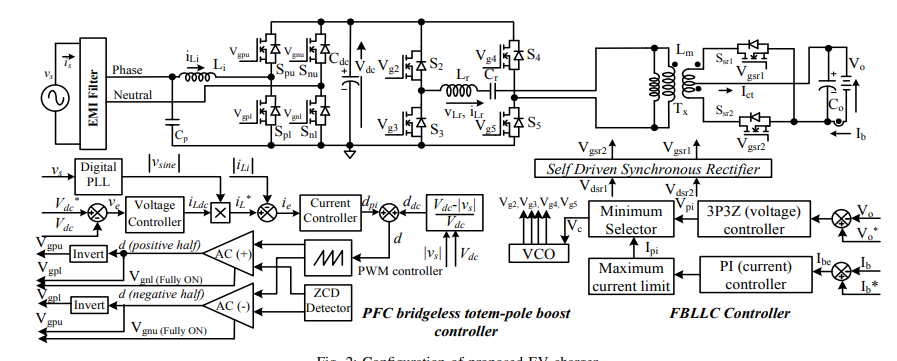A High Efficiency Modular EV Charger Using Bridgeless and Resonant Converters
Objective
The main objective of this project is to charge the Electric Vehicle by using bridgeless and Resonant Converters.
Abstract
In this project, a bridgeless totem pole boost converter (BLTPBC) fed synchronous full bridge inductor-inductor-capacitor (FBLLC) converter based electric vehicle (EV) charger as a fundamental building block for larger capacity EV infrastructure. This EV charger comprises of BLTPBC as a front end power factor correction (PFC) converter followed by a high efficiency synchronous FBLLC converter for DC-DC conversion. The PFC TPBLB is operated in continuous inductor conduction mode at fixed frequency, while the control of synchronous FBLLC converter is performed using pulse frequency modulation (PFM). The performance of this EV charger is deeply analyzed during steady state and transient conditions by a developed proto-type and are discussed and presented. The performance of this EV charger in a large EV structure composed by paralleling these chargers is also presented by virtue of its short circuit performance. The simulation results are validated by using Matlab/Simulink 2018a Software.
Keywords: Power factor correction (PFC), bridgeless totem pole boost converter (BLTPBC) continuous inductor conduction mode (CICM), full bridge inductor-inductor-capacitor (FBLLC), zero voltage switching (ZVS), power quality (PQ).
NOTE: Without the concern of our team, please don't submit to the college. This Abstract varies based on student requirements.
Block Diagram

Specifications
Software Configuration:
Operating System : Windows 7/8/10
Application Software : Matlab/Simulink
Hardware Configuration:
RAM : 8 GB
Processor : I3 / I5(Mostly prefer)
Learning Outcomes
- Introduction to Matlab/Simulink
- What is EISPACK & LINPACK
- How to start with MATLAB
- About Matlab language
- About tools & libraries
- Application of Matlab/Simulink
- About Matlab desktop
- Features of Matlab/Simulink
- Basics on Matlab/Simulink
- Introduction to controllers.
- Study of PWM techniques.
- Project Development Skills:
- Problem analyzing skills
- Problem solving skills
- Creativity and imaginary skills
- Programming skills
- Deployment
- Testing skills
- Debugging skills
- Project presentation skills
- Thesis writing skills


 Paper Publishing
Paper Publishing
